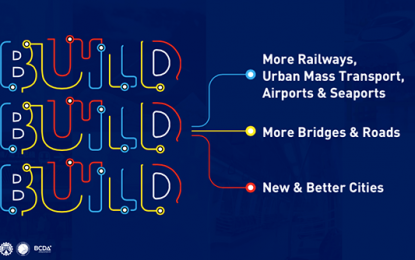
MANILA – The government’s infrastructure program and the agriculture sector will be among the main growth drivers of the Philippine economy this year despite the impact of the coronavirus disease 2019 (Covid-19) pandemic.
In a virtual briefing, after the signing on Tuesday of two big-ticket projects in the Visayas and Mindanao with a combined amount of PHP75.5 billion, Finance Secretary Carlos Dominguez III said he is confident that both the Department of Transportation (DOTr) and the Department of Public Works and Highways (DPWH) are ready to implement their projects after weeks of delay due to the implementation of the community quarantine in Luzon.
Dominguez said the DWPH, which handles about 90 percent of the government’s infrastructure program, is “fully ready” to resume construction activities.
The government’s recovery program “relies heavily” on the implementation of projects under the priority “Build, Build, Build” (BBB) program and the strengthening of the agriculture sector, he added.
“Agriculture is big because, you know, the demand for food is inelastic,” he said, noting that the sector is a major contributor to the recovery of areas outside Metro Manila and a plus to the government’s “Balik Probinsya” program that encourages people to return to their provinces to decongest the country’s capital.
Dominguez further said the BBB has the highest multiplier effect among the government’s infrastructure programs because it requires a large number of workers and provides “services and public goods that are totally necessary for reducing the cost of transportation and logistics within the country.”
“So you can expect towards the second half of the year acceleration of the projects,” he added.
Dominguez likened the current situation to last year when the approval of the national budget was delayed, which hampered the timely implementation of BBB projects.
During the same briefing, DPWH Secretary Mark Villar said the department was able to spend about PHP700 billion for the implementation of the infrastructure program and meet its target despite starting construction only in the second half of last year.
Villar said they expect a similar outcome this year based on their experience.
“We’ve discussed our targets for this year and again, we’re quite confident that (since) we’ve done it before, (we’re going to) hit the target again this year as we establish a new guideline. So, it’s all systems go at this point,” he said.
Meanwhile, the pact signed between the Philippine and the Japanese governments, through the Japan International Cooperation Agency (JICA), pertains to the PHP57-billion (119 billion Japanese yen) loan for the construction of the Cebu-Mactan Fourth Bridge and the Coastal Road Construction project in the Visayas, and the supplemental financing of PHP18.5 billion (35 billion yen) for the Davao City Bypass Construction Project.
The loans have been given concessional lending terms of 0.10 percent annual interest rate for non-consulting services and 0.01 percent for consulting services, with a maturity period of 40 years, inclusive of a 12-year grace period.
Specifically, the Cebu-Mactan Fourth Bridge and the Coastal Road Construction project is the Visayas’ biggest infrastructure project under the BBB, with a total estimated cost of PHP76.4 billion.
It is targeted to improve the current road network between Cebu and Mactan Island through the construction of a 3.3-km. bridge with an elevated viaduct; and a 4.9-km. four-land coastal road with an elevated viaduct.
The JICA will finance 75 percent of the project’s total cost through official development assistance (ODA) financing, while the balance of PHP18.82 billion will be financed through local borrowings.
The Davao City Bypass Construction project is aimed at reducing congestion in Davao City and improving accessibility to its major development hubs through the construction of a 45.5-km. four-lane bypass road.
The Department of Finance (DOF) said the project also includes a 2.3-km. the main tunnel that will be constructed using advanced Japanese technology, and a 0.5-km. four-lane cut-and-cover tunnel section that will run through the mountainous terrain in Barangay Magtuod, Davao City.
Construction will start this year and the project is expected to be operational by 2023.
The DOF said JICA would provide a PHP18.5-billion loan for this project, which is “supplemental to the loan accord worth PHP9.27 billion (23.9 billion yen) signed in 2015.” (PNA)
